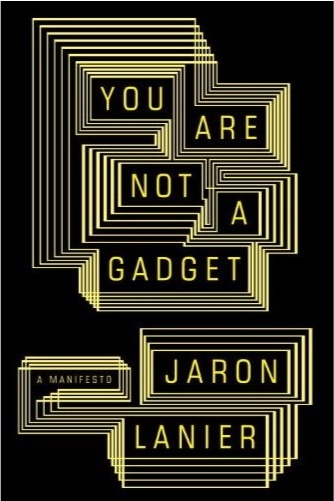Those of you who have been lucky enough to join us for a Northern Voice conference over the last 6 years know what a transformative event it can be, and those who haven’t have likely heard enough of us prattle on to that effect to either want to come or want us to shut up. This year did not disappoint. Indeed, with the exception of the absence of He Who Shall Not Be Named, it was a near perfect event, combining friends old and new, learning and working together and some ‘far out’ moments. This is my effort to stitch together my gleanings from the last 5 days. It is not a chronological accounting, though it does hopefully tell a story.
Abstraction, Embeddedness, Critique, Analysis and Discourse
 I have been reading Jaron Lanier’s “You are not a Gadget” over the past 2 weeks with great gusto. It is a wonderful humanist critique of the de-humanizing dangers of Web 2.0 by someone with hard-core technological cred. It is not scaremongering, and it is not reductive, but a subtle reading by someone who truly gets what we do when we “program” something. It resonates with me because my technophilia and post-modernist tendencies have always been tempered with heavy doses of humanism. A tricky balance indeed.
I have been reading Jaron Lanier’s “You are not a Gadget” over the past 2 weeks with great gusto. It is a wonderful humanist critique of the de-humanizing dangers of Web 2.0 by someone with hard-core technological cred. It is not scaremongering, and it is not reductive, but a subtle reading by someone who truly gets what we do when we “program” something. It resonates with me because my technophilia and post-modernist tendencies have always been tempered with heavy doses of humanism. A tricky balance indeed.
I don’t want to put words into Jon Beasley-Murray’s mouth, but I felt like his talk (which was slotted in my mind quite nicely along with @davecormier’s) had a similar feel; I took it not as a condemnation of all things network, open or technological, but as a caution against naive technological utopianism and an urging to situate our analyses within the multiple dimensions that “technology” “knowledge” “the University” etc. exist. This caused me to reference (and indeed come to understand even more deeply than I had) the term “Power/Knowledge” which many will know from Foucault. And he’s right – if we don’t actively engage this, either someone else will (quite possibly someone of an unpalatable political bent) or changes will take place that needlessly disrupt aspects of our society we’ll wish hadn’t vanished. Simply wishing won’t make it so.
In both of these and a number of other interactions throughout the 4 days, I came to see the “embedded” (or “embodied” – I know it’s different but it comes up later too) nature of knowledge, institutions, communities, and that analysis that tries to reduce them to just one or a few key variables is, well, reductive. To which some will simply reply “duh!” But we do not *have* to settle for that (and herein lies my complaint of the larger “naive empiricism” approach, though not a claim that every empiricist is naive). Part of “not settling” is realizing it’s not a finite conversation but an ongoing one, always already ongoing, that we join in, it proceeds us, will carry on after us, and yet *doesn’t happen without us.* Part of “not settling” is developing new ways of understanding/inhabiting complex contexts that work with multiple dimensions/variables/polarities at once.
“Healthy” Communities, Boundaries, Adjacencies and Non-reductive Analysis
Now before you start your chorus of “Kumbaya,” let me tell you about an analyses/process that I think does just that. On my way over a day before Northern Voice to a gathering of Online Community Enthusiasts, I was re-reading the new book “Digital Habitats: stewarding technology for community” by Etienne Wenger, John D. Smith, and that most chocolatey goddess of the chalk drawing, Nancy White. I cannot recommend it highly enough to you – if you work with communities, if you work in online learning, or even if you are simple interested in the practice of technology assessment, this is for me a groundbreaking work.
 Recall – I spent 7 years working on Edutools, a site that allowed people to perform a features-based side-by-side comparison of Learning Management Systems. So I have struggled with the question of how to help people make technology choice in a “rational” way, a way “that scales” (by definition, reductive). As I read this new book, which describes a process of community self-identification of “orientations” that can then help guide (but not determine) the choice of specific tools, features or platforms (a seemingly obvious yet often overlooked distinction made in the book as well), it was like the scales fell from my eyes. One can argue with the number of “orientations” or the specific ones (though these are borne out of these three wise people’s long experience working with actual communities.) But the approach strongly resists a de-contextualized, one size fits all approach in favour of one that starts from the primary importance of specific, not abstract, context. (And note to Nancy – I will never stop apologizing for using the term “community in a box” and see how, not only being wrong and offensive, it is deeply mis-leading and underlies the whole approach I’m decrying here. Forgive me, please!). Does it scale? MU! Ask the question again.
Recall – I spent 7 years working on Edutools, a site that allowed people to perform a features-based side-by-side comparison of Learning Management Systems. So I have struggled with the question of how to help people make technology choice in a “rational” way, a way “that scales” (by definition, reductive). As I read this new book, which describes a process of community self-identification of “orientations” that can then help guide (but not determine) the choice of specific tools, features or platforms (a seemingly obvious yet often overlooked distinction made in the book as well), it was like the scales fell from my eyes. One can argue with the number of “orientations” or the specific ones (though these are borne out of these three wise people’s long experience working with actual communities.) But the approach strongly resists a de-contextualized, one size fits all approach in favour of one that starts from the primary importance of specific, not abstract, context. (And note to Nancy – I will never stop apologizing for using the term “community in a box” and see how, not only being wrong and offensive, it is deeply mis-leading and underlies the whole approach I’m decrying here. Forgive me, please!). Does it scale? MU! Ask the question again.
During a break on the Thursday I took the chance to ask Nancy a question – “What is a ‘healthy’ community?” In looking at these various orientations it struck me that there must be recognizable ‘patterns,’ say, of a “successful open source community,” that could help us recognize others when we see them.  This is exactly right and exactly wrong; as Nancy helped me understand, exactly wrong because it locates the notion of health in some abstract standard outside the community, when the notion of health being put out here is about internal coherence and accord – is the community becoming (or at least striving to be) what it wants to be.
This is exactly right and exactly wrong; as Nancy helped me understand, exactly wrong because it locates the notion of health in some abstract standard outside the community, when the notion of health being put out here is about internal coherence and accord – is the community becoming (or at least striving to be) what it wants to be.
Before we fall headlong into absolute relativism, I think for the “exactly right” (more like “kind of right”) part of the above, the reason we can use the words “community” or “healthy” *at all*, we need to look towards Wittgenstein’s notion “family resemblance” – we can recognize them as “healthy” because of many overlaps, not one single one, and we recognizers can do so precisely because of our embeddedness in the practices of looking at these things.
Which explains, for me at least, why I was reluctant to comment on the “success” of #altmoosecamp other than to say “well it seemed to go ok, lots of people showed up and shared which was *my* hope for it.” I am a part of that community. According to Dave Cormier, I “stopped acting like a hippy and stepped up” by helping to organize it, take a “leadership” role, but it was (I think a new term Dave and I coined on the walk to dinner that night) “rhizomatic leadership” – leadership that isn’t afraid to inherit a model or to lead in a way that helps others similarly copy from it, learn from it, or indeed insert themselves into it (like @nancywhite exhibited so superbly when, after seeing me lament “oh how is poor old *me* supposed to organize the schedule for #altmoosecamp without being all sorts of dictatorial” she simply placed her name beside a time slot – uh, duh, Scott, build an empty schedule and then invite *the community* to chose and discuss their slots. Lead by creating space for others, not by doing it for them. #slowlearner).
 “Rhizomatic” came up a lot this weekend (and not just because Dave Cormier was there.) Indeed if I had to pick a “theme” for the conference, it would be “Rhizomatic” (though I am still struggling through the metaphor – I think I now “get” it, just not sure it properly reflects the permeable “entities” that “family resemblance” is getting at above.) Perhaps it was just that I was listening with these ears (perhaps? ha!) but the solutions I was seeing that really turned me on, and they were everywhere, were “rhizomatic” – authentic, lived in, organically grown, and done in such a way that as long as a seed gets carried by the wind somewhere “else,” a “new” rhizome can start – a different one? yes. ex nihilo? no. The medium IS the message, or impacts the message because the message should not, can not, be abstracted out of it. Not only do you not need 1 million people consuming the same single source, the uniform audience, the “mass,” (even if you could get this to happen anymore in our rapidly fragmenting world,) but we should not aim for it. Aim instead for 100 people, all of whom, precisely in part because of the intimacy of the connection, will in turn aim at a 100 people. Aim your message as a form of rhizomatic leadership, a message that leaves space for others. Not just with words. With actions. Kurt, you might have felt “stupid and contagious” but I don’t and won’t wait around for anyone to “entertain us.” And I know a hell of a lot of people who feel the same way.
“Rhizomatic” came up a lot this weekend (and not just because Dave Cormier was there.) Indeed if I had to pick a “theme” for the conference, it would be “Rhizomatic” (though I am still struggling through the metaphor – I think I now “get” it, just not sure it properly reflects the permeable “entities” that “family resemblance” is getting at above.) Perhaps it was just that I was listening with these ears (perhaps? ha!) but the solutions I was seeing that really turned me on, and they were everywhere, were “rhizomatic” – authentic, lived in, organically grown, and done in such a way that as long as a seed gets carried by the wind somewhere “else,” a “new” rhizome can start – a different one? yes. ex nihilo? no. The medium IS the message, or impacts the message because the message should not, can not, be abstracted out of it. Not only do you not need 1 million people consuming the same single source, the uniform audience, the “mass,” (even if you could get this to happen anymore in our rapidly fragmenting world,) but we should not aim for it. Aim instead for 100 people, all of whom, precisely in part because of the intimacy of the connection, will in turn aim at a 100 people. Aim your message as a form of rhizomatic leadership, a message that leaves space for others. Not just with words. With actions. Kurt, you might have felt “stupid and contagious” but I don’t and won’t wait around for anyone to “entertain us.” And I know a hell of a lot of people who feel the same way.
 This post is getting ridiculously long, and I doubt anyone is still reading it (really? thanks for sticking with it), so one last point before the finale. During the Online Community Enthusiasts gathering on Thursday we spent the afternoon doing a session on “Boundaries” led by Alice MacGillvary. I only “kindof” got it during the day; it took the rest of the weekend for it to fully percolate through how profoundly this topic of boundaries is to all of this work and thinking on networks, learning and communities. It relates to the above topic of “family resemblance” – the ability to recognize something without having to reify it as *only* that thing, that set of limited values. And it relates to Northern Voice as a whole, a “social media” conference (how much more nebulous can you get), the value of which is often in the intermixing of communities, disciplines, practices, the crossing of boundaries. This came up again in the #altmoosecamp session led (surprise surprise) by Nancy White (really, I’m a fanboy but not a rabid one, promise!) and was captured in the wonderful expression “Unexpected Adjacencies.” One follow up I hope to do (and others hopefully will join in) is to share those outliers, those “unexpected adjacencies” from our RSS readers, those people who inform our practice, inform our personhood, but who are not immediate peers, who come from some different discipline or practice. It can only make us richer.
This post is getting ridiculously long, and I doubt anyone is still reading it (really? thanks for sticking with it), so one last point before the finale. During the Online Community Enthusiasts gathering on Thursday we spent the afternoon doing a session on “Boundaries” led by Alice MacGillvary. I only “kindof” got it during the day; it took the rest of the weekend for it to fully percolate through how profoundly this topic of boundaries is to all of this work and thinking on networks, learning and communities. It relates to the above topic of “family resemblance” – the ability to recognize something without having to reify it as *only* that thing, that set of limited values. And it relates to Northern Voice as a whole, a “social media” conference (how much more nebulous can you get), the value of which is often in the intermixing of communities, disciplines, practices, the crossing of boundaries. This came up again in the #altmoosecamp session led (surprise surprise) by Nancy White (really, I’m a fanboy but not a rabid one, promise!) and was captured in the wonderful expression “Unexpected Adjacencies.” One follow up I hope to do (and others hopefully will join in) is to share those outliers, those “unexpected adjacencies” from our RSS readers, those people who inform our practice, inform our personhood, but who are not immediate peers, who come from some different discipline or practice. It can only make us richer.
…and several small furry bloggers gathered together in a cave grooving with a giant
Huh? Well, how else to describe an event that capped off all the above richness with two tremendous gatherings at Casa Lamb y Mcphee with some of the people I love most in the world, taking our thinking and bonds even further in a 100 mini-jams throughout the evening, even managing to invoke the spectres of those who couldn’t be there. The EduGlu singers were most DEFINITELY in the house.
And “The Giant?” Well, none other than Bryan Alexander – a “giant” to me, someone I have hoped to meet for a long time, and who did not disappoint. His keynote was funny and insightful, managing to cross the uncanny valley of academia and social media denizens, and his presence (which, sadly, I did not get enough time to spend in) warm, smart, funny. It is amazingly gratifying those times you get to meet your intellectual pacesetters and they turn out to be all you’d hoped for (Bryan – should I have left the title intact and referred to you as a “Pict?” Wasn’t sure – not everyone takes well to being referred to as a “Pict” 😉
The End
Anyways, if you made it this far, please leave a comment, if only to let me know someone read all this (and I may even create a new Nessie Award for “Reader who persisted the furthest through one of my overwordy posts” in your honour!) Hats off to all of the Northern Voice organizers – you have done a great service not just to Vancouver but to far further flung reaches in helping to foster community and lead rhizomatically. Here’s to many more to come. Northern Voice is Dead. Long Live Northern Voice.











